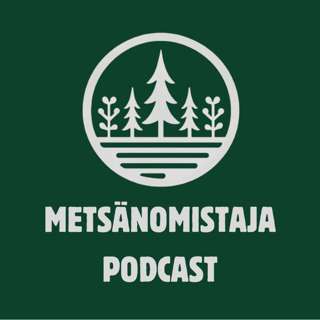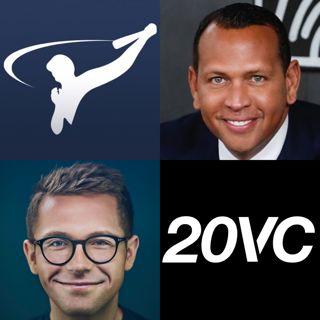
20VC: Alex Rodriguez (AROD) on Investing Lessons from Warren Buffet, How a Meeting with Magic Johnson Changed His Approach to Business and The Single Best and Worst Investment Decisions he has Made and Why AROD Is Not Buying More Real Estate
Alex Rodriguez is a businessman and the Chairman and Chief Executive Officer of A-Rod Corp, a broad-based investment firm that bets on world-class startups and partners with leading global companies across the real estate, health and wellness, technology, and sports & entertainment industries. While best known as one of the world's greatest athletes (a 14x MLB All-Star and a 2009 World Series Champion with the New York Yankees), for more than 25 years, Alex leads a team of experts building high-growth businesses and is co-owner of the Minnesota Timberwolves. In Today's Episode with Alex Rodriguez 1.) From MLB to Business MVP: How Alex made his transition from one of the world's greatest athletes to the world of business? What does Alex know now that he wishes he had known at the start of his business career? What is Alex running away from? How do his insecurities drive him? 2.) Lessons from Magic Johnson and Warren Buffet: What are some of the single biggest lessons Alex has learned from his time with Warren Buffet? How did Magic Johnson impact Alex's approach to business? What is Magic Johnson's framework? How can others use it as a blueprint for their career? 3.) Alex Rodriguez: The Business Builder and Investor: What has been Alex's single biggest investing hit? What did he learn from it? What has been Alex's single worst investment decision? How did that change his approach? Why is Alex not buying real estate currently? How does he view the future of real estate buying? 4.) Alex Rodriguez: The Father and Son: How did having two daughters impact Alex's approach to business and life? What have been Alex's single biggest lessons from seeing his single mother operate? How does Alex reflect on his own relationship to money? How has it changed?
5 Touko 202336min
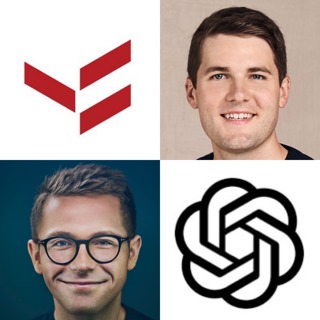
20VC: The OpenAI Memo: Why Invest? Is it too Late to Catch OpenAI? Are OpenAI's Models Truly Defensible? Does the Value in AI Accrue to Incumbemts or Startups - Application Layer/Infrastructure? What Happens with Regulation? with Vince Hankes @ Thrive
Vince Hankes is a Partner @ Thrive Capital where he has led the firm's investments in OpenAI, Melio, and Airplane.dev. He currently sits on the board of Airtable, Benchling, Lattice, and Melio. Prior to joining Thrive, Vince was an investor at Tiger Global where he learned the craft of venture from the legend that is Lee Fixel. In Today's Episode with Vince Hankes We Discuss: 1. From Tiger Global to Partner @ Thrive Capital: How Vince made his way into the world of investing with Tiger Global? What are 1-2 of his biggest takeaways from working alongside the legendary Lee Fixel? Why did Vince make the move from Tiger to Thrive? How do the two firms differ? 2. The OpenAI Investment: The Memo: How did the OpenAI deal come to be? What were the round dynamics? Market Evaluation: How did Vince and the team analyze the market top down? Competition: Who did Vince identify as the core competitors to OpenAI? Defensibility: How did Vince think through the long-term defensibility of OpenAI's model? Does Vince believe these models will become commoditised? Price: How did Vince and the team get comfortable with the $29BN price? 3. AI: Hype or Generational Defining Transformation: Trend or Transformation: Why does Vince believe AI will be the defining technology of our generation? Startup vs Incumbent: Does Vince think the value will accrue to the incumbent or the startup? Open or Closed: Does Vince think we will operate in a closed (one model rules them all) environment or an open-source environment with many models? AI Talent: Where does Vince think the majority of the best AI talent will concentrate? Speed: Why would Vince be scared if he were a startup today looking at the incumbents? 4. The Changing Investor: Lessons from Good and Bad: How has Vince changed most significantly as an investor over time? What has been his single biggest investing mistake? How did he learn from it? What has been his biggest investing success? How did that change his mindset? What has Thrive done in their org structure to allow them to make bets very few other firms can do?
3 Touko 202350min
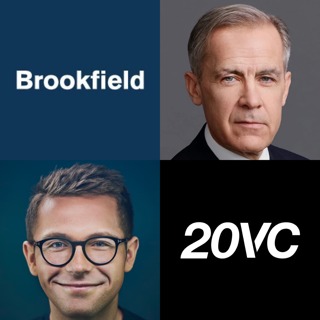
20VC: First Republic; Management Responsibility or Result of Contagion in the System, The Future of Regional Banks, Will Interest Rates Go Higher | Net Zero, Where Are We? The Best and the Worst Actors with Mark Carney, Former Governor of The Bank of Engl
Mark Carney is the Vice Chair and Head of Transition Investing @ Brookfield Asset Management, one of the world's leading asset managers with over $800BN in AUM. Mark is also United Nations Special Envoy on Climate Action and Finance. He has also served as Finance Advisor to the British Prime Minister. In addition to this, Mark is on the board of Stripe, PIMCO and The World Economic Forum. In a previous life, Mark spent over a decade as a Central Banker, most recently as Governor of The Bank of England and before that as Governor of The Bank of Canada. In Today's Episode with Mark Carney We Discuss: 1. Is The Banking Crisis Over? What Happened? Why does Mark not believe we are in a banking crisis? Why does he not believe the banking turmoil is over? Was SVB the fault of regulatory mistakes or management mistakes? Is FRB a damaged asset in it's own right or the result of contagion within the banking ecosystem? 2. The Impact of the Banking Turmoil: What Happens Now? What does Mark believe is the future of regional banks? Why does Mark believe we will see massive consolidation in banks coming soon? Should the Fed be guaranteeing all deposits automatically? 3. What Happens To The Macro Now? How does the banking turmoil impact growth rates? Will we definitely go into a recession now? What is the impact on monetary policy? Can the Fed raise rates even higher? What does this mean for the future of money? Why is it a silver bullet for stablecoins? If Mark could bet on China or the US for the next 10 years, who would it be? Does Mark believe the UK is in a weaker situation than ever? What about Europe? 4. The Future of Climate and Net Zero: Where are we at with Net Zero? Are we ever going to make progress? Is it possible to make progress without the cooperation of China? Why does Mark disagree and suggest China has done more than most to help the climate? Who is talking more than they are acting in the fight to save the climate? On the flip side, who is acting more than they are talking?
1 Touko 202349min
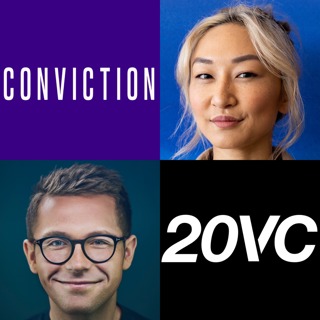
20VC: In AI Who Wins? Startups or Incumbents? What Happens to Wealth Inequality? Why Will $10BN+ Companies Only Have 10 People | Why Defensibility in Startups is BS & Speed is Everything? Why Large Groups Worsen Decision-Making with Sarah Guo
Sarah Guo is the Founding Partner @ Conviction Capital, a $100M first fund purpose-built to serve "Software 3.0" companies. Prior to founding Conviction, Sarah was a General Partner at Greylock where she made investments in the likes of Figma, Coda, Neeva and many more incredible companies. Sarah also hosts her own podcast, No Priors with the wonderful Elad Gil. In Today's Episode with Sarah Guo We Discuss: 1. From Large Multi-Stage Firm to Founding Conviction: Why did Sarah decide to leave Greylock? What are 1-2 of her biggest lessons from her time at Greylock? How did they impact her mindset when building Conviction today? What does Sarah believe are the most surprising or hardest elements of firm building? 2. The Future for AI: The Opportunities and the Challenges: Why does Sarah believe AI is the most foundational technology of our lifetime? Why did Sarah decide to centre the entire fund around AI? Is AI not an enabling technology that will power all sectors in technology? Is Sarah concerned by the further wealth inequality that AI and billion dollar companies created by 10 people, will inevitably bring? How does Sarah think about the potential for malicious AI use? What can be done to prevent this? 3. Startup and VC Principles That Are BS: Why does Sarah believe that defensibility is BS? Why do Sarah and Harry both believe that reserves in venture funds are a suboptimal use of funds? "Great founder, bad market, market wins". Does Sarah agree? How does Sarah prioritize the centrality of founder vs market? 4. Sarah Guo: The Investor How has Sarah changed most significantly as an investor over the last 5 years? What is Sarah's biggest miss? How did it impact her mindset today? What is Sarah's biggest win? How did that alter her risk appetite? How does Sarah see the future of venture? If Sarah could invest in one multi-stage firm and one seed-stage firm, which would it be?
28 Huhti 202344min
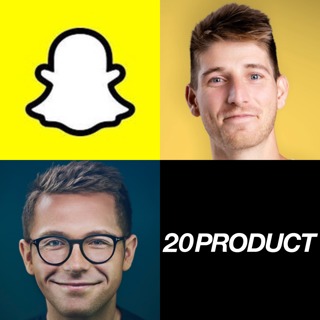
20Product: Snap's VP Product on How Snap Hires 10x Product People, What Makes Evan Spiegel So Special at Product, Three Ways to Prioritise Product Ideas in Teams, The Future of AR, Why Snap Glasses Will be Huge and Snap Will Be Massive in Japan with Jack
Jack Brody is the VP Product @ Snap. Jack joined Snap in 2014 as a Product Designer, and ultimately helped build out the design organization as the Head of Design before taking on his current role overseeing all of Product for the Snapchat application and Hardware. In his 9 years at Snap, he helped create Memories, the Snap Map, and AR Lenses like Face Swap. In Today's Episode with Jack Brody We Discuss: The Shortest Internship in Tech: How did Jack get an internship with Evan Spiegel and Snap while he was still at college? How did it turn into the shortest internship in tech history? What are the single biggest product lessons Jack has from working with Evan Spiegel? 2. Product 101: Art vs Science: Does Jack believe product is more art or science? If he were to assign numbers to them, what would they be? How does Jack define creativity? What can founders and product leaders do to ensure their teams are as creative as possible? What is the 3 step framework through which product leaders should prioritize product ideas? Does Jack believe that when the CEO is no longer the Head of Product, the company is dead? Does Jack agree with Gustav Soderstrom, "talk is cheap, so we should do more of it"? 3. The SNAP Hiring Process: What Works and What Does Not: What is the hiring process for the product team at SNAP? What questions are most revealing of 10x product people in the interview process? What case studies and tests does Jack use in the interview process? What other roles and functions does Jack bring into the interview process as part of the decision? What are the single biggest mistakes founders make in the hiring process for product? 4. SNAP, The Future, and The World Around Us: What do Jack and SNAP believe will be the future for augmented reality? What country is SNAP not big in today but will be in the next 5 years? Why that one? Why did SNAP tear down its android app and start again? What has been the impact? Were the SNAP glasses a success? What is their future?
26 Huhti 202356min
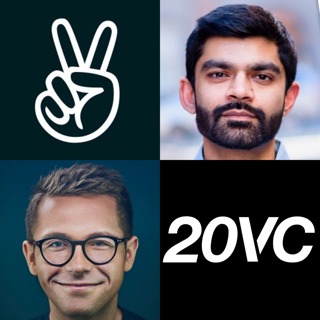
20VC: WTF Is Going On In Venture Capital; Seed Round Pricing Will Remain High, Series B & C Has Gone Completely, Downrounds Are Coming | Why Defensibility is BS on Day 1, Why Market is More Important Than Founder & Why Being First To Market Doesn't Matter
Avlok Kohli is the CEO @ AngelList. Under his leadership, Avlok has taken AngelList from an SPV provider to a company that is becoming the software platform for the entire industry. Today, AngelList supports over $15BN in assets and 40% of US unicorns have had a GP invest in them through AngelList. Prior to becoming CEO @ AngelList, Avlok founded 3 companies, all of which were acquired including by the likes of Square and eBay. In Today's Episode with Avlok Kohli We Discuss: 1. From 3x Founder to Scaling AngelList to $15BN in AUM: How did Naval convince Avlok to join AngelList and be CEO? Does Avlok believe in startups having defensibility in the early days? How important does Avlok believe it is for companies to be "first to market"? Why does Avlok believe all the last-mile grocery delivery companies will go bust in the downturn? 2. What is Going On in Venture: New Funds, LPs, Secondaries: Are we seeing the amount of net new funds reduce in the downturn? Are we seeing the size of new funds being raised, being smaller? Is the time to first close increasing in time? Does AVlok agree that the fund segment hit hardest by the downturn is micro fund managers? Which LP class has pulled back from fund investing most significantly? Why does Avlok believe institutions have returned to fund investing more than ever right now? Are we seeing an increase in fund secondary positions? 3. What is Going on in Startups: Rounds, Valuations, Party Rounds Are we seeing the number of startups able to close their round reduce? Are we seeing the size of startup funding rounds reduce? How does this depend on the stage? What are we seeing for startup valuations? Why is seed as high as ever? What is the most hit? How is the composition of funding rounds changing? More or fewer party rounds? When does Avlok believe we will see down rounds and pay-to-play, really come into effect? 4. The Business of AngelList and its Future: What are the margins on AngelList products today? What is the best margin AngelList product? What is the worst? What product did AngelList do that in hindsight, Avlok wishes they had not done? Why did AngelList back out of Europe? Was it a mistake? How does Avlok think about AngelList's fierce competition with Carta today?
24 Huhti 202351min
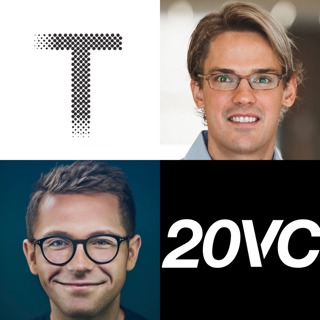
20VC: Who Wins in AI; Startup vs Incumbent, Infrastructure vs Application Layer, Bundled vs Unbundled Providers | From 150 LP Meetings to Closing $230M for Fund I; The Fundraising Process, What Worked, What Didn't and Lessons Learned with Tomasz Tunguz
Tomasz Tunguz is the Founder and General Partner @ Theory Ventures, just announced last week, Theory is a $230M fund that invests $1-25m in early-stage companies that leverage technology discontinuities into go-to-market advantages. Prior to founding Theory, Tom spent 14 years at Redpoint as a General Partner where he made investments in the likes of Looker, Expensify, Monte Carlo, Dune Analytics, and Kustomer to name a few. Tom also writes one of the best blogs and newsletters in the business which can be found here. In Today's Episode with Tomasz Tunguz We Discuss: Founding a Firm: The Start of Theory: Why did Tom decide to leave Redpoint after 14 years to found Theory? What are 1-2 of his biggest lessons from Redpoint that he has taken with him to his building of Theory? What does Tom know now that he wishes he had known when he started investing? 2. From 150 LP Meetings to Closing $230M: Raising a Fund I How would Tom describe the fundraising process? How many meetings with LPs did he have? How many did he know previously? What documents did he share with LPs? Did he have a dataroom? How did he use it? How did Tom create a sense of urgency to compel LPs to come into the fund? How does Tom feel about the debate between one close and multiple closes? What was the #1 reason LPs said no to investing? What worked and Tom would do again for the next raise? What did not work and he would change for the next raise? 3. Where Will Value Accrue in the Next Decade of AI: Startup vs Incumbent: Will incumbents embrace AI before startups are able to acquire distribution? Infrastructure vs Application Layer: Where will the majority of value accrue in the next decade; infrastructure or application layer? Bundled or Unbundled: Will bundled services be the dominant consumer and enterprise choice or will unbundled specialized solutions win? 4. AI and The World Around It: How does Tom believe AI could save the US economy? Why does Tom believe Google are the losers in the AI race? Which incumbents have responded best to AI? Why does Tom believe we will be in a worse macro place at the end of the year than we are now?
21 Huhti 202353min
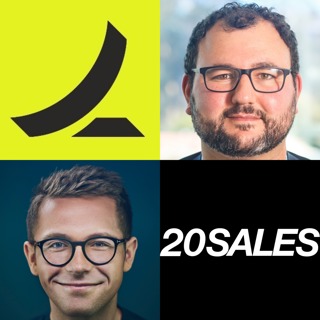
20Sales: Why You Should Never Hire a VP Sales First, How To Create Urgency in a Sales Process, How to Do Traditional Outbound 10x Better, Why Revenue Doesn't Matter with Your First Customers | Mark Goldberger, Head of Enterprise Sales @ Ramp
Mark Goldberger is Head of Enterprise Sales at Ramp, the fastest-growing corporate card and bill payment software in America, and recently named Most Innovative Company in North America by Fast Company. Prior to joining Ramp, Mark was the first enterprise rep at TripActions (now Navan), where he helped bring in more than $100m of ARR as an IC and sales leader. Before TripActions, Mark worked at Highfive, a video conferencing company since acquired by Dialpad. In Today's Episode with Mark Goldberger We Discuss: 1. From Wine Industry to Sales Leader: How Mark made his way into the world of enterprise sales having been in the wine industry? Mark sent out 100 CVs for his first sales role, why did they not respond? How should companies think differently about the people they hire? What could he have done better with the outreach? What does Mark know now that he wishes he had known when he entered the world of sales? 2. The Sales Playbook and Why You Should Never Hire a Sales VP First: Why does Mark believe that you should never hire a Sales VP as the first sales hire? What does Mark mean when he says product-customer-fit is more important than product-market-fit? Why does Mark believe that revenue does not matter with your first customers? If revenue does not matter, what should you be trying to get out of them? When should the founder handover sales to either a junior or more senior hire? 3. How to Hire 10x Sales Teams: The Process: How does Mark structure the process for hiring 10x sales reps? What questions are most revealing in identifying a 10x sales rep? How do they respond? Why does Mark want candidates to pitch his own product back to him? How does Mark make the hiring process more challenging to really test the quality of candidates? What is the core difference between losers and winners in sales? 4. Discounting, Champions, Creating Urgency: Why does Mark not like discounting? Where do many sales teams use it poorly? How does Mark like to create urgency in a sales process? What works? What does not? How can sales reps know whether they truly have a deal champion within a buyer? What is the right way for sales reps to ask to meet the exec buyer? When is the right time to ask to meet the exec buyer? What are some clear signs that you are not speaking to a decision-maker? 5. Building a High-Functioning Sales Org: What is the right way to do deal reviews? How often? Who should be invited? What is the right way to do sales onboarding for all new reps? Why is traditional outbound still the most important thing in a sales process? Why do so many people get pipeline qualification so wrong?
19 Huhti 202349min






















